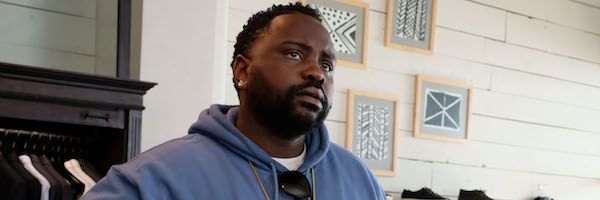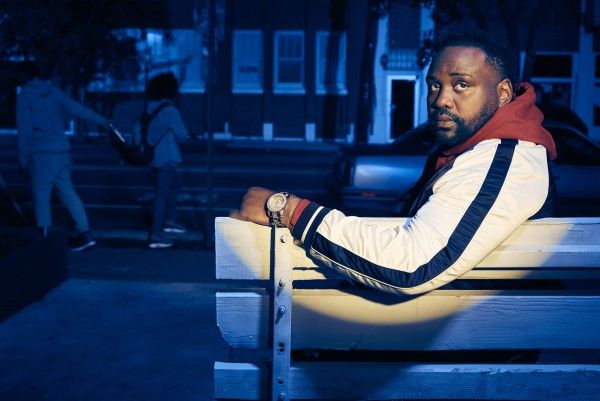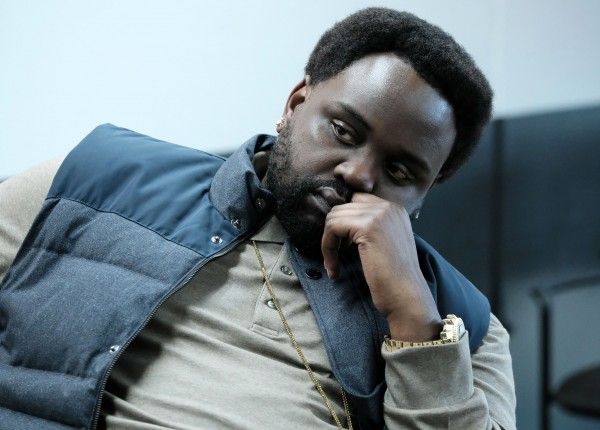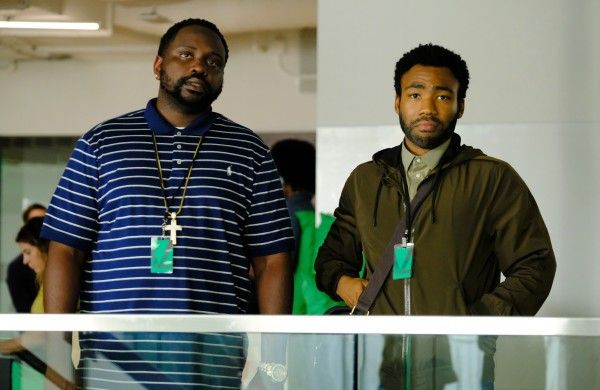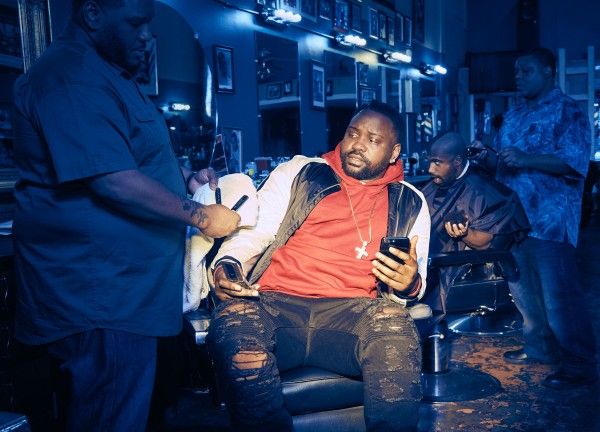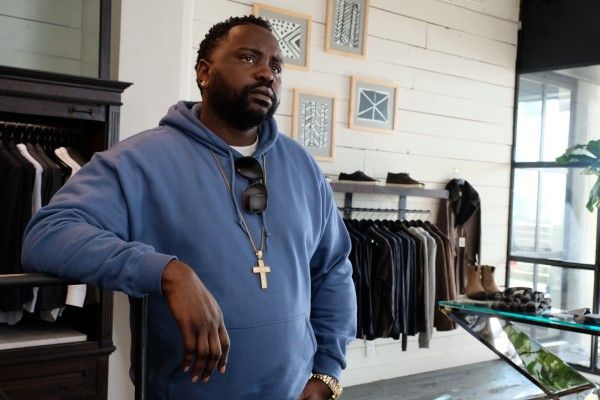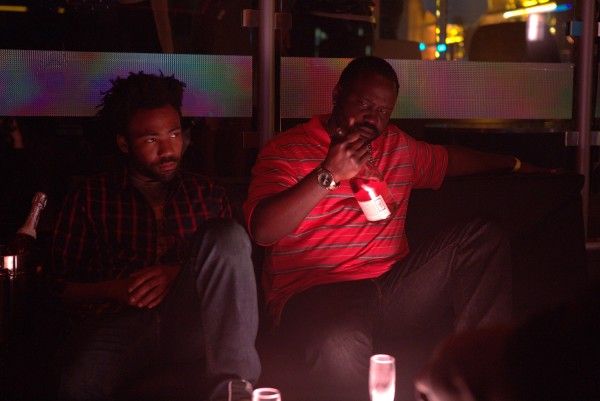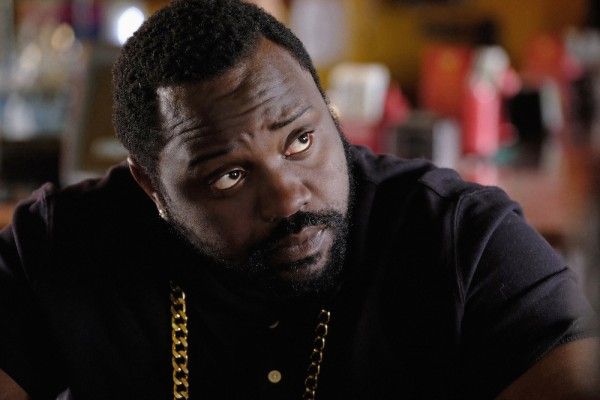From creator Donald Glover (who is also the series star and an executive producer, writer and director), FX’s Atlanta, dubbed Robbin’ Season for its sophomore effort, has had some of the most compelling and thought-provoking storytelling and next-level excellence in acting on television, and it just keeps getting better. It’s funny and it’s painful, in the best blend of comedy and drama, and it’s blown up all audience expectation.
During this 1-on-1 phone interview with Collider, actor Brian Tyree Henry, who plays Alfred “Paper Boi” Miles, the cousin of Earn Marks (Glover) and a star rapper who’s trying to come to grips with fame, talked about his tremendous performance in the recent episode “Woods” (Episode 208) and why it was one of the most difficult things he’s ever done, coming to terms with the affect of fame and celebrity, the “Barbershop” episode (Episode 205), what Donald Glover brings as a director, and reflecting the absurdity of life in the series. He also talked about his return to Broadway for Lobby Hero, the experience of working with filmmakers on the level of Steve McQueen (on Widows) and Barry Jenkins (on If Beale Street Could Talk), and making Hotel Artemis with his good friend Sterling K. Brown.
Collider: I have to say really, really tremendous work on the “Woods” episode. Every time I think Atlanta can’t freak me out any more than it already has, it seems to find new ways.
BRIAN TYREE HENRY: Oh, that’s good!
It’s funny, I was one of the people that was very skeptical of this show, in the beginning, because I don’t watch a lot of half-hours and I just wasn’t sure if I could relate to a show about Atlanta, but it’s really proven itself to be one of the most incredible shows on TV. It’s just really terrific!
HENRY: Thank you very much. Thanks!
Obviously, the “Teddy Perkins” episode was disturbing enough, and then “Woods” ramped things up even further. What was it like to shoot “Woods”?
HENRY: It was one of the most difficult things I’ve ever done in my life. Collaborating with Stefani Robinson, who wrote the episode, and Hiro [Murai], who directed it, they really challenged me to go ahead and confront some things that were really terrifying for me to confront. The parallels between Alfred and myself, at that time, were very, very, very present, and they just really found a way to pull this thing out of me. Well, I wouldn’t really say pull because it leapt out of me, out of necessity. We get these moments in our lives where we don’t really know where we are, we don’t know what to do, and we don’t know which way to go. Stefani just wrote something so remarkable and so incredible that I had to just get over what my fear was about, with what I was doing, and just really confront it. hat was very necessary for Alfred, as well. Do you play the game, or do you not play the game? Who are you, in this land that you’ve been born and raised in, that you don’t know anymore? And when you lose people that you navigated it with, when you’re alone, there’s that true feeling of loneliness. It was hard. It was really hard, just that sense of danger and that level of vulnerability that you have to have. It can be fucking jolting to somebody. So, I think that Stefani put down on paper exactly what I wanted to say, and I think Hiro captured exactly how I felt. I was very honored, but Jesus, it was really, really, really, really tough.
To watch Alfred go from getting a pedicure to then not knowing if he was going to make it out of the woods alive, I was like, “When did this become a horror movie?!”
HENRY: Yeah, but that’s the thing about fame and celebrity, I guess. You just cannot do the things that you used to do anymore and nobody really cares about what you lost. Nobody knows what you go through. They just wanna see the persona that they admire, and I think that that was a big realization that I had to have. For that very final scene, here I am covered in dirt and brush and blood and, at the end of the end of the day, they want the picture, so you have to step up to take the picture while still covered in the essence of all the things that you’ve been through. You’ve still gotta do it. That was a huge lesson. That episode was a huge lesson for me, and it could very well be the thing that saves my life.
In comparison, how was the experience of shooting the “Barbershop” episode? Was it ever hard not to crack up with Robert Powell carrying on like he was?
HENRY: You know what, it was both. Stefani wrote that episode, too, and I remember talking to her and her saying, “Let’s see how far we can really push Alfred’s sanity, in a way.” Yet again, it’s another place that he knows. It’s a place he goes to all the time. It’s a place that’s familiar, and yet, at the same time, he sits down on this day and it’s completely different. Throughout the whole episode, he really, really tries to keep his patience about this familiar person that he knows, taking him on unfamiliar territory. He can’t do the same thing that he used to because he’s on probation. He has this photo shoot he has to go to and he has to get his hair cut, and it’s the only person he knows to do it, but this person decides to be different and take advantage of his fame. What do you do? For this season, it’s a huge realization of what the future holds for him, which is something that I don’t think he’s really thought about. I think he was more of a day-to-day kinda guy. Now, he has to really think about investing in himself, which is terrifying. It’s a terrifying thought.
How would you describe working with Donald Glover, as a director, in comparison to what he’s like, as a co-star and fellow actor?
HENRY: There’s an unspoken trust. You know that he has your back, and you want to do as much as you can. But the most you can do, sometimes, is the very little that you do, and he sees that. He sees everything. Every single reaction that I got in “Barbershop,” he caught it. He caught every single thing that Alfred was going through, that I was putting forth. That’s very rare. Him and Hiro have this very amazing talent of just letting the characters breathe, working within the space of silence. There’s a trust there with Donald, and you show up and wanna do your best, but it’s not you having anything to prove. There’s a trust that they have for you, to know that you know how to walk through this character and they know how to capture that in the way they want to see it. So, it’s not about impressing and it’s not about trying to put something out there that you hope makes them proud. They just wanna see you live, and they’ll capture it.
Have you had any conversations about possibilities for Season 3 and where things could go?
HENRY: Of course, but Season 2 is still going. There’s no telling what’s gonna happen, in between then just with life. That’s been the greatest gift of Atlanta, just observing life and seeing where it goes. Then, we’ll come together and find the absurdity of it, and make something great.
You’ve had such great reviews for your work in Lobby Hero, on Broadway. Was it more scary or more exciting to return to Broadway, after having been a part of a huge hit like The Book of Mormon?
HENRY: It was both, actually, because I had so many doubts about whether I would be received with open arms, being back on stage, if people even know that’s where I started. My life has been a constant succession of reset buttons. It’s been like, “Okay, you’ve done this, but now you went off and did this, so if you go back to this, are people gonna trust that you’re good enough?” You’ve got all eyes on you, sometimes, and you tend to doubt yourself. It’s so ridiculous to do that, but it’s a discovery. Every single thing is a discovery. Even going back to Atlanta for the second season, after we took a year off, I was terrified that I didn’t know who Alfred was anymore. I was like, “Who is he? Who is this guy that I’ve been away from for so long?” But you’ve gotta just dive in, man. It’s gonna sound so corny, but you’ve gotta listen to your heart, you’ve gotta be very present about it, and you’ve just gotta go. And the thing about theater is that I’ve gotta do this every day. Even tonight, I have to get up and do this. I have to do it every day, and tell this story every day. The atmosphere does not change the outcome of what my character goes through. That, in itself, is tough, and you’ve gotta be present. That’s been something that I’ve realized, as I grow in this industry, is to be present.
What’s it been like to have that trio of actors to go through it with – with Chris Evans, Michael Cera and Bel Powley?
HENRY: They’re great, man. It’s another thing about trust. I wanna make sure that I’m there for my company. I wanna make sure that I’m there for my ensemble. I love this theater so much, from the crew to stage management to costumes. We’re all a family, really. Bel, Chris and Michael always say, “Of course, we’ll do this because we know you’ll do it for us.” And I’m like, “Wow!” To hear that kind of trust from somebody, when you’re putting together this story and this landscape to entertain people, that they really trust you that way is unlike anything I’ve ever experienced. For some of them, it’s their first time venturing out, doing the stage. In a way, people call me the vet and I’m like, “Am I the vet?,” because technically, this is my first time experiencing this, too. But we’re doing this together and the only way you can get to the end is by doing it together, no matter how hard the structure of the story is. That’s a huge thing with Atlanta, as well.
You’ve also worked recently with Steve McQueen on Widows and Barry Jenkins on If Beale Street Could Talk, and those are two really tremendous directors. How did you find the experience of working with them?
HENRY: Equally as jaw dropping. It’s happening so fast. Once a project is done, you don’t really have a second to be like, “Holy shit, I just worked with Barry Jenkins!” We filmed Beale Street about six blocks from my house in New York and it was something that made me realize, “Okay, this is where you belong. What does this character need to have said, that only you can bring?” And so, I just take it one minute at a time. And Steve McQueen is absolutely phenomenal. He was unbelievable. To be able to work with such talent as these men and these black directors, it was unlike anything in the world. I’m just really glad that I was present for it. Really, all I could do was be present.
You’ve been friends with Sterling K. Brown for some time now. You did the episode of This is Us and now you’ve got Hotel Artemis together. What does your friendship with him mean to you and how does that translate to your working relationship, especially on that film?
HENRY: Well, you have to believe, at some point, people will see the connection and wanna work from there. Sterling and I had a moment, in our careers, where we would sit by and watch our friends blow up, and there was never any anger or competition or resentment. It was just like, “Hey, man, our time is coming! Hopefully, if we keep doing what we do, our time is coming!” That, to me, is something that is very overlooked. We’re on this journey together. So, at some point, it’s just a matter of time before people go, “You know what? Let’s check these guys out.” The difference is, once it happens, you can actually mold the way that you want people to view you. We were like, “Hold up, we’re brothers, man.” The chemistry that we have is so natural and so great. When this project (Hotel Artemis) came around, it was a no-brainer. It was like, “Let’s go! Let’s do this, man!” I’m just really grateful that (writer/director) Drew Pearce even saw that. He saw the comradery and the connection that we have, and we were able to shape this movie that way. It’s always gratifying to watch the journey that Sterling is going on, and to hear him watch me. I’m far east, and he’s far west, but it’s like we’re in the same place, at all times. It’s never gonna get old, watching the blossoming of his career. It makes me want to constantly keep doing what I’m doing, so he can feel the same way.
Having just seen the trailer, that movie definitely looks wild.
HENRY: Yes, it’s definitely very wild. I love it!
When you started on Atlanta, what were you hoping it could be, from the potential that you saw in it, and how has that compared to what it’s become?
HENRY: I didn’t really have a hope of it being anything. It was the first television show that I booked where I was the lead, and there really wasn’t a worry. I went to college in Atlanta. Atlanta is my home. It’s literally where I discovered that I wanted to be where I am today, and I was ready to get back there. I was just ready to get back there and be in that environment that I knew so well. Once the scripts started coming in, I was like, “Whoa, hold up! This is something new. This is something fresh. This is something that I could really vibe with. The people that I’m working with are not gonna let me fall. W’'re not gonna let each other fall. We’re gonna have a hell of a time telling these stories.” And that’s what we did. The success of it, we couldn’t think that far ahead. Some may have, but I couldn’t think that far ahead.
If I think that far ahead, how the hell can I be present in what I’m doing right now. I didn’t wanna lose the fun of that. I didn’t wanna think about ratings. I didn’t wanna think about whether we’d get renewed or not. I just wanted to go out there and put my all in this thing that we have right now, and whoever it reached, it reached, and that would speak for itself. But in no capacity, did I think it would reach as far and beyond as it did. That, to me, is a testament to when you have that kind of unit and when you have that kind of symbiosis with somebody, and with the life of a story. It can completely break down any kind of walls anyone can put up to say that you can’t. It just did something. It defied expectations, and I think we defied expectations within ourselves. I think we have to completely erase the word expectations from our vocabulary. It wasn’t necessary. We showed up, we did what we did, and we wanna continue to do that.
You’ve talked about the challenges of playing Alfred, but what do you most enjoy about getting to play him?
HENRY: That I never know where he’s gonna go. You know what, let me rephrase that. That I never know where the world around him is gonna go. I really love knowing where Alfred’s relationship to everybody else around him is because, if there’s anything that I know for a fact with Alfred, it’s that there’s loyalty. He cares about family, a lot. It’s very interesting to watch him watch people change around him, and to watch the world change around him and to see how he reacts to it. I think that’s the big thing about [the “Woods” episode]. You spend so much time watching people trying to tell you to be this and do that, and then you’re left in the middle of this wilderness with no one, at all. You can’t call Earn. You can’t even call anybody you know. How would anybody know where you are? I think that was something he had to realize. You gotta pick your team well and you have to pick your family well and you have to pick your relationships well because you never know when you may end up in a place that is deserted and it’s just you. I think that that’s my favorite thing with Alfred, just watching him discover who he can trust and who cares about him. I don’t know when the last time was that somebody just came up to Alfred and said they love him, just to say they love him. That can weigh on a person. I think it’s really fun to watch his growth and to watch him really start to discover a different way of living. Not just surviving, but how to live.
With around 500 shows on TV now, it gets really easy to feel like you’re just watching the same thing. The incredible thing about Atlanta is that I really have no idea what it’s going to be, from week to week.
HENRY: That’s what we want.
That’s awesome! It’s great to have that. It’s nice to still have something unexpected.
HENRY: Well, that’s what we’re aiming for.
Atlanta airs on Thursday nights on FX.

